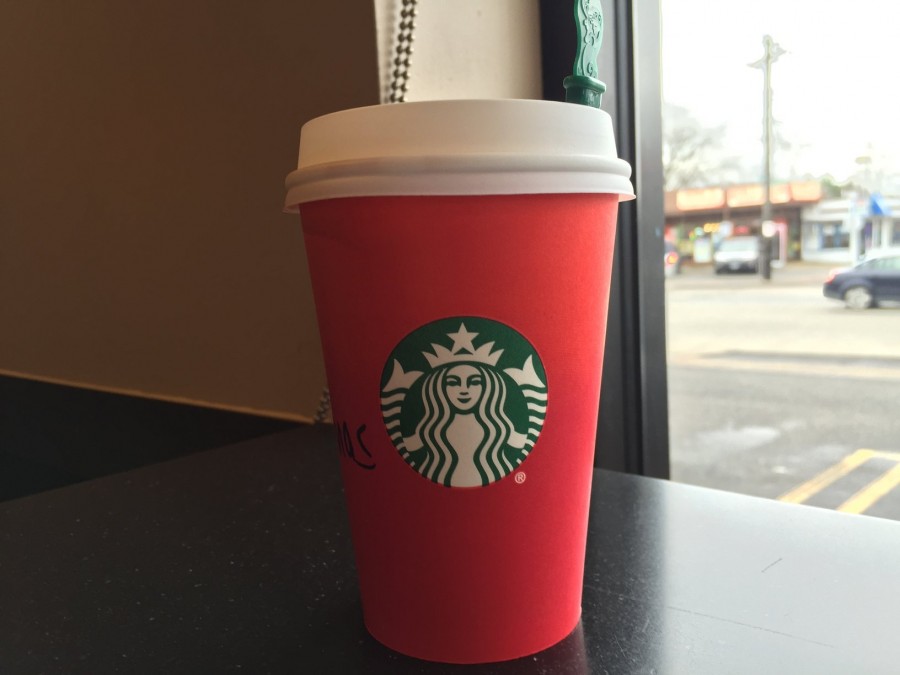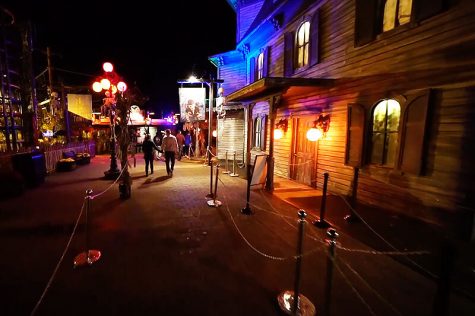EDITORIAL: Political correctness during the holidays— has America gone too far?
The Starbucks cup controversy became one of the most talked about topics this holiday season.
In the wake of the holiday season, consumers have been greeted by an unexpected gift this year—unlike the usual surprises under the tree, people have been given the unexpected gift of “political correctness.”
Political correctness is not technically a new thing in society, nor has it really ever been a term used by people during the holidays. A few years back, employees at stores across America had been told to say “Happy Holidays” instead of “Merry Christmas” to their customers. This caused an uproar, but mostly from just the huffs and puffs of people who felt like they were having their Christmas season taken away from them.
Most recently, controversies like Starbucks taking away their Holiday themed cups and replacing it with a plain, ombré colored red design or the Roosevelt Field Mall not putting up a Christmas tree have stirred up waves of thoughts and opinions. Many people feel as though since not everyone celebrates Christmas, there should not be an entire exhibit filled with Christmas decorations, standing by the ideology of political correctness. Others have felt the complete opposite, feeling as though their Christmas season is being taken away because people feel offended by ornaments and a tree.
People who feel political correctness is necessary for a better society are clearly heard on social media.
“Not everyone celebrates Christmas!” or “It’s offensive to people of different religions!” is constantly shown on social media. These internet sites are used as vehicles for people to cry out against injustice. However, what is so offensive about a Christmas Tree? And why can people of different religions be offended by religions such as Christianity, but whenever a Christian makes a religious remark in regards to his or her religion, people on social media put that person on blast for not “respecting other’s beliefs?”
“People try overly hard to be politically correct in today’s society, [and are] very quick to cry cultural appropriation. Acts done against one culture can be viewed as correct, while the same acts against another group can be deemed racist,” senior Kaitlyn Oddo said.“By trying so hard to include all religions and ethnic groups, people often generalize or manage to offend another group of people. If everyone just relaxed and… [not] get offended over every perceived microaggression, the world and the holiday season would be a happier place.”
In reality, political correctness is anything but correct, because the actual idea is nearly impossible to pull off. In order for free speech to be deemed “politically correct,” one loses their right to freely speak in the first place.
“If there were no menorahs hung up during Hanukkah, despite the fact that a large majority of the population doesn’t celebrate the holiday, people would claim that places that did not put up Hanukkah decorations were ‘anti-semitic,’” Oddo said.
Another thing that has really added fuel to the fire is the offense of the Christmas decorum. Those who demand the elimination of Christmas related decorations are often the same people who constantly call out individuals for not respecting other beliefs. Ultimately, different religions and beliefs should be respected across the board.
Social media has also been used to go against political correctness. For example, Roosevelt Field Mall initially replaced the traditional Christmas decor surrounding a Santa Claus photo-op and instead provided glacial themed decorations. Many took to Facebook, Twitter, and other sites to express their anger over the situation. According to Newsday, “Some protesters accused the company of being ‘anti-Christmas’ or ‘too politically correct.’ Others threatened to shop elsewhere.” People also felt that if the Roosevelt Field makes so much profit from the holiday season— wherein a significant amount of profit is contributed to Christmas shopping—it is almost as if they are putting their customers on the backburner. After facing immense backlash on social media, Roosevelt Field Mall put back up a Christmas Tree.
Each year, Starbucks customers eagerly await the widespread company rollout of their “holiday cups,” cups decorated with wintry, and sometimes, Christmas themes. However, this year, Starbucks replaced their fan-favorite cup with a plainer design. According to Starbucks, the unadorned red design is meant to be used as a “blank canvas” to have customers create their own stories. However, many still are angered by Starbucks, as some see it as a possible attempt at political correctness. Some, using social media to speak out against these instances, claim that political correctness is creating “war on Christmas.” Many customers have taken to social media, making suggestions of writing “Merry Christmas” instead of their names. However, this is unlikely to make any change in Starbucks’ policies, as the angry customers are creating more business for Starbucks.
Although somewhat controversial, these debates and arguments over the political correctness of Christmas have spiraled out of control because of social media. Social media is both beautiful and ugly when it comes to allowing people to say what they believe in, and because of this, people have been tempted to join in the debate. Why not? In order to get your message out there, it takes thirty seconds of your time.
However, because of all these ideas and opinions being thrown out for the world to see, people, and society in general, have become more polarized than ever before. Sure, changing the calendar to satisfy other people’s beliefs sounds just as silly as running down the street slapping people with “Merry Christmas” stickers on their face, so why can’t society just agree to meet somewhere in the middle?
Throw up the Christmas tree, hang your ornaments, sing Christmas carols at the top of your lungs! You know why? Because you have the right to-the same right as someone who wants to light a menorah or wear a hijab or niqab or burqa, or to not worship any religion at all.



